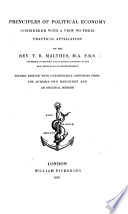
Book II, Chapter I, On the Progress of Wealth, Section VIII, p. 382-383
Principles of Political Economy (Second Edition 1836)
Context: Every exchange which takes place in a country, effects a distribution of its produce better adapted to the wants of society....
If two districts, one of which possessed a rich copper mine, and the other a rich tin mine, had always been separated by an impassable river or mountain, there can be no doubt that an opening of a communication, a greater demand would take place, and a greater price be given for both the tin and the copper; and this greater price of both metals, though it might be only temporary, would alone go a great way towards furnishing the additional capital wanted to supply the additional demand; and the capitals of both districts, and the products of both mines, would be increased both in quantity and value to a degree which could not have taken place without the this new distribution of the produce, or some equivalent to it.
